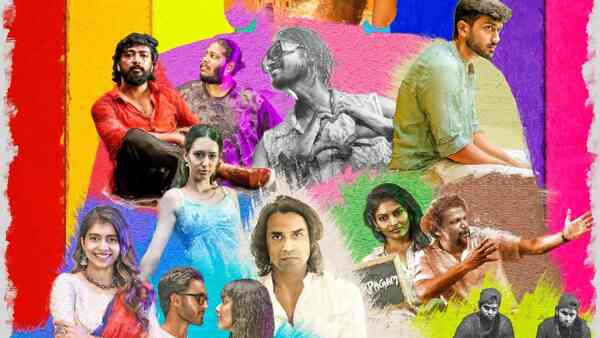Natchathiram Nagargiradhu Review: Pa Ranjith's latest anti-caste film is a powerful take on society's regressive notions of love
Summary: A theatre group comprising a diverse mix of people comes up with an idea to question society's notions and hold on love through their latest play.

A poster of Natchathiram Nagargiradhu
Last Updated: 08.45 PM, Aug 31, 2022
Story: A Puducherry-based theatre group comprising a diverse mix of people comes up with an idea to question society's notions on love through their latest play. As the work on the play progresses, the characters lay bare their souls and undergo self-transformation as well even as they take on caste, religion and gender inequalities in love
Review: Love is political- that's the tagline of Pa Ranjith's latest offering, Natchathiram Nagargiradhu. We get a peek of it in every frame of the film, right from the first scene where Rene (Dushara Vijayan) and Iniyan (Kalidas Jayaram) are having a heated discussion on Isaignani Ilaiyaraaja's music. While Rene considers Ilaiyaraaja's achievement as a symbol of empowerment for the oppressed communities, Iniyan is dismissive of the composer. We get to know the stark differences in their personalities right there. They break up after the altercation. But it's not because of their contrasting preferences in music, but Iniyan reminds Rene of something that has been following her like a shadow all her life, her caste identity.
Rene (Her actual name is Tamizh) is a Dalit, who calls herself a collection of broken pieces of a mirror. She is feisty, daring, gallant and free-spirited , but behind her spirited personality, lies the agony of being discriminated against all her life due to her caste. Be it getting into mud to give way to a dominant caste person, jeered at in school for eating beef and for using reservation to move ahead in life, Rene has faced it all. So, she has decided to live life on her own terms. She dresses well, reads a lot and is sassy. "That's my social identity," she proudly declares. When one of the characters in the film asks, "Are you a Communist?" she replies, "I am an Ambedkarite," while gorging on some beef fry.
The plot is set against the backdrop of a theatre group in Puducherry, who are trying to come up with a new play on the concept of love. As the members begin to discuss various interpretations of love, including breaking barriers of caste, religion and gender, yet another conflict arises. Arjun (Kalaiyarasan, who hails from a dominant caste) makes a snide remark on naadaga kaadhal (fake love), a bigoted narrative in Tamil Nadu about Dalit youngsters dressing stylishly to lure women from the dominant castes and to vilify inter-caste marriages (a reference to the same was made in the controversial film Draupathi). The director of the play decides to set the plot around love caged by caste endogamy and heterosexuality.
We get to see the bigotry that is casually passed off as normal in our society through Arjun's eyes. (Kalaiyarasan pulls off one of his career-best performances as a bigot, transphobic, homophobic and misogynist). While he dismisses physical attraction in a relationship as lust, he, at the same, asks his fiancée to send a selfie of hers despite her telling him that she is just out of her bath. He later slams her for wearing a sleeveless dress with a plunging neckline. His abhorrence is crystal clear when he squirms while sitting next to a transwoman in the theatre group and when he peers in disgust at a gay and lesbian couple in the troupe.
But it's the same Arjun who undergoes a transformation after Rene decides to give him a second chance after an incident where Kalaiyarasan goes out of control. Rene states that one needs to acknowledge one's bigotry to change themselves for the better. "It's a life-long process of learning. He should face each of us. He will never learn if he leaves," she says. Iniyan's character is that of a typical jilted lover, who at the same time, goes through different phases of self-consciousness and awareness as the film progresses. When Rene forgives Arjun, Iniyan is unable to comprehend why she wouldn't forgive him.
Though Dushara shines as Rene, there are certain parts where she seems slightly off the mark. Kalidas has put up a convincing performance as a confused youngster who has his preconceived notions. The entire supporting cast has pulled off a nuanced performance. The film is a riot of colours, thanks to the theatre backdrop, thus marking a tectonic shift in the tone of a Ranjith film. Music by Tenma complements the story and brings a freshness to the film. The song Rangarattinam is a treat to watch. The cinematography by Kishor Kumar and editing by Selva are excellent, too.
Pa Ranjith's Natchathiram Nagargiradhu is easily one of his most powerful films and finest works in the annals of anti-caste cinema. The film addresses the many inequalities in love. For instance, one of the queer characters in the film is ostracised for his sexual orientation, but at the same time, has the privilege of belonging to a dominant caste. There is also a reference to how Dalit communities, too, tend to discriminate against each other. Almost every dialogue hits you hard and makes you reflect on the society. Though the film is a tad too long, it doesn't get boring.
One of the characters in the film says, "If only we all understood that we are just a speck in the vast universe, life would be so much fun." And we sincerely hope everyone understands that by the time we walk out of the theatre.
Verdict: Natchathiram Nagargiradhu holds a mirror up to the society's regressive ideas of love and dares to question them. A must watch!

 Premium
Premium